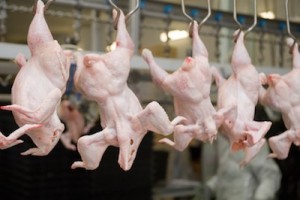John Howard, director of the CDC’s National Institute for Occupational Safety and Health (NIOSH), sent a letter to Al Almanza, FSIS administrator last week, telling him that the USDA’s Food Safety Inspection Service misinterpreted findings of a NIOSH study evaluating worker safety vis a vis increased line speeds at poultry processing plants.
 That study looked at worker injuries and disorders and waivers of line-speed restrictions at a Pilgrim’s Pride plant. Poultry plant line workers use a combination of “highly repetitive and forceful movements that places employees at an increased risk for upper extremity WMSDs (work related musculoskeletal disorders).”
That study looked at worker injuries and disorders and waivers of line-speed restrictions at a Pilgrim’s Pride plant. Poultry plant line workers use a combination of “highly repetitive and forceful movements that places employees at an increased risk for upper extremity WMSDs (work related musculoskeletal disorders).”
NIOSH conducted an evaluation of employees who worked at the plant that was granted a waiver for regulatory line speeds under the Salmonella Initiative Program. The letter states, “in its evaluation of the plant before any production line speed changes had occurred, NIOSH investigators found an alarming 42% prevalence of carpal tunnel syndrome in exposed workers.” NIOSH returned to the plant after modification of the plant’s production lines, and found a “continuing high prevalence of musculoskeletal symptoms.”
When the study was released, Almanza wrote a blog post stating that “some have claimed that the allowed speed increase for evisceration lines would lead to higher injury rates among poultry plant workers. But a newly released report provides evidence that this isn’t the case.”
That statement is misleading, according to Howard. NIOSH did not make that conclusion in the study, and Howard stated that “line speed affects the periodicity of repetitive and forcemeat movements, which are key causes of musculoskeletal disorders.” In addition, Howard says Almanza generalized findings from one plant studied to other plants, even though the report says that the findings “may not be representative of other poultry processing plants.”
Howard also stated that “NIOSH investigators found during their second visit that the changes made by the plant to production line speed did not result in an increase in production volume for the individual worker or the plant, but actually resulted in a reduction of the number of birds processed from 180 to 175 birds per minute. Therefore, no conclusions can be drawn regarding the effect of line speed changes and health status.”
FSIS personnel continued to make misleading claims about the NIOSH study at an April 3 House Appropriations Committee hearing. USDA undersecretary for food safety Brian Ronholm said at the hearing, “the NIOSH report also confirms that increasing line speed does not have a negative impact on worker injuries.” Congresswoman Rosa DeLauro corrected Mr. Ronholm at the hearing.




